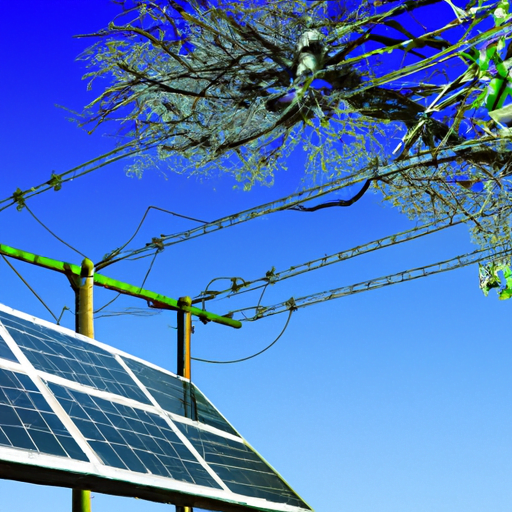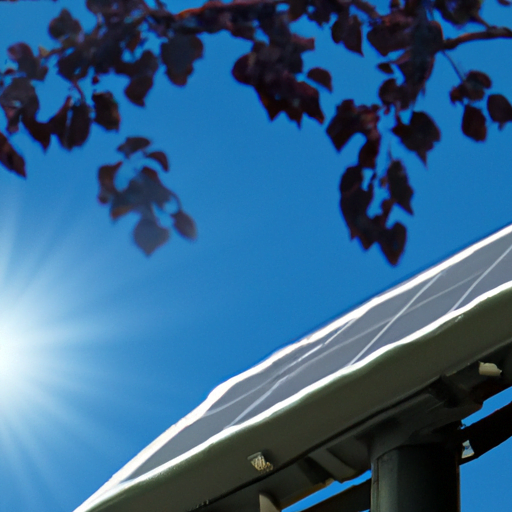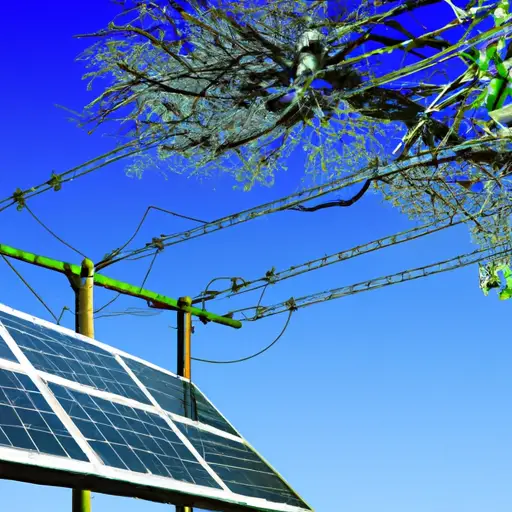So, have you ever thought about living off the grid? You know, completely independent from the electric power company, generating your own electricity? It’s an intriguing idea, isn’t it? But then again, maybe you’re hesitant to take such a big leap and wonder if there’s a middle ground. That’s where the concept of hybrid systems comes in. In this article, we’ll delve into the pros and cons of on-grid, off-grid, and hybrid systems, so you can make an informed decision.
Let’s start with on-grid systems. This is the traditional way of getting electricity, where you’re connected to the power company’s grid. It’s convenient because you don’t have to worry about generating your own electricity or storing it. The power is always available, and you simply pay your monthly bill. However, it does come with its drawbacks. For instance, if there’s a power outage, you’ll be left in the dark like everyone else. Plus, you’re at the mercy of the utility company’s prices and policies.
On the other hand, living off-grid means you’re completely self-sufficient when it comes to power. You generate your own electricity, usually through solar panels or wind turbines, and store it in batteries for use when the sun isn’t shining or the wind isn’t blowing. It’s a liberating feeling to be independent from the power company and have full control over your energy needs. However, off-grid living requires a significant upfront investment and ongoing maintenance. Plus, you may need to make some lifestyle adjustments to ensure you’re conserving energy.
Now, let’s talk about hybrid systems. As the name suggests, these systems combine the best of both worlds – on-grid and off-grid. You remain connected to the grid, so you have access to power whenever you need it, but you also have your own renewable energy system, which reduces your reliance on the grid. This can be a great option if you want the security of always having power even during outages, while still reducing your environmental footprint and potentially saving money in the long run. Of course, there are some considerations, such as the initial cost and the complexity of managing both on-grid and off-grid components.
In this article, we’ll dive deeper into the advantages and disadvantages of on-grid, off-grid, and hybrid systems, helping you make an informed decision about which option is right for you. So stay tuned to learn more about how these systems work and which one aligns with your needs and preferences.

Exploring the Pros and Cons of On-Grid, Off-Grid, and Hybrid Systems
Living off the grid has gained significant popularity in recent years, as more and more individuals seek to reduce their reliance on traditional energy sources and embrace a self-sustainable lifestyle. However, before choosing to disconnect from the utility grid, it is important to understand the advantages and disadvantages of living off-grid. Similarly, on-grid and hybrid systems also have their own unique set of pros and cons. In this article, we will explore the benefits and drawbacks of on-grid, off-grid, and hybrid systems, and help you determine which option may be the best fit for your energy needs and lifestyle.
Understanding On-Grid Systems
On-grid systems, also known as grid-tied systems, are connected to the utility grid. These systems generate electricity from renewable sources, such as solar panels or wind turbines, and feed the excess energy back into the grid. In return, you receive credits from the utility company for the electricity you generate. On-grid systems are the most common and widely used option, primarily because of their ease of installation and lower initial costs.
Advantages of On-Grid Systems
One of the major advantages of on-grid systems is their ability to eliminate or significantly reduce electricity bills. By generating your own electricity, you can offset the amount of energy you consume from the grid, resulting in substantial savings. Additionally, on-grid systems require less maintenance since they do not rely on batteries for energy storage, which reduces the overall system costs.
Another advantage of on-grid systems is their reliability. With an on-grid system, you have access to a continuous and reliable power supply, even during periods of low solar or wind energy generation. This is due to the fact that you can draw electricity from the grid when your system isn’t producing enough power, ensuring that you always have access to electricity when you need it.
Disadvantages of On-Grid Systems
Despite their many advantages, on-grid systems are not without their drawbacks. One major disadvantage is their dependence on the utility grid. If there is a power outage or the grid goes down, on-grid systems will not be able to provide electricity to your home, as they are designed to automatically disconnect from the grid for safety reasons. This means that during emergencies or natural disasters, you may still experience power outages, even if you have an on-grid system.
Another limitation of on-grid systems is their environmental impact. While these systems do generate clean and renewable energy, they are still connected to the grid, which in some cases relies on conventional fossil fuel-based power plants. This means that the overall carbon footprint of an on-grid system is not entirely eliminated, as some of the energy consumed may still come from non-renewable sources.
Exploring Off-Grid Systems
Off-grid systems, also known as stand-alone systems, operate independently of the utility grid. These systems generate electricity from renewable sources and store the excess energy in batteries for later use. Off-grid living offers the ultimate independence and self-sustainability, but it also comes with its own set of advantages and disadvantages.
Benefits of Off-Grid Systems
The primary advantage of off-grid systems is the complete independence they provide. By generating and storing your own electricity, you are no longer reliant on the utility grid. This means that you have the freedom to live in remote locations where grid connection may not be feasible or cost-effective, allowing you to embrace a more rural or off-the-grid lifestyle.
Another key benefit of off-grid systems is their reduced environmental impact. These systems rely solely on renewable energy sources and do not contribute to greenhouse gas emissions. By choosing to live off the grid, you are actively reducing your carbon footprint and minimizing your impact on the environment.
Additionally, off-grid systems offer resilience in case of power outages. Since these systems have their own battery storage, they can continue to provide electricity even during blackouts or grid failures. This can be of great importance, especially in areas prone to frequent power disruptions or during natural disasters.
Drawbacks of Off-Grid Systems
One of the major disadvantages of off-grid systems is the higher upfront costs. These systems require a larger initial investment compared to on-grid systems, primarily due to the need for batteries and additional equipment for energy storage. This can make off-grid systems less financially feasible for some individuals, particularly those on a tight budget.
Another limitation of off-grid systems is the higher maintenance requirements. Since these systems need to be self-sufficient in terms of energy generation and storage, regular maintenance and monitoring of the batteries and other components are essential. This can be time-consuming and may require specialized knowledge or professional assistance.
Analyzing Hybrid Systems
Hybrid systems, as the name suggests, combine the best of both on-grid and off-grid systems. These systems are connected to the utility grid but also have battery storage for backup power during outages or periods of low energy generation. By combining the benefits of both systems, hybrid systems offer increased flexibility and optimal energy management.
Advantages of Hybrid Systems
One of the major advantages of hybrid systems is their flexibility. These systems can draw electricity from both the renewable energy sources and the grid, allowing for optimal utilization of available resources. During times of high energy demand or low renewable energy generation, hybrid systems can automatically switch to grid power, ensuring a continuous and reliable electricity supply.
Another advantage of hybrid systems is their ability to provide backup power during emergencies or power outages. The battery storage component allows you to store excess energy generated during periods of high renewable energy production and utilize it when needed. This ensures that you always have access to electricity, even when the grid is unavailable.
Disadvantages of Hybrid Systems
One of the major disadvantages of hybrid systems is the higher upfront costs compared to on-grid systems. The addition of battery storage increases the overall system costs. However, it is important to note that the costs of batteries have been decreasing in recent years, making hybrid systems more financially viable for many individuals.
Another limitation of hybrid systems is their reliance on grid availability. In case of a complete grid failure, hybrid systems will not be able to provide electricity, as they are designed to automatically disconnect for safety reasons. This means that during extended power outages, you may still experience periods with no access to electricity, even with a hybrid system.
Comparing On-Grid, Off-Grid, and Hybrid Systems
When considering the pros and cons of on-grid, off-grid, and hybrid systems, there are several key factors to consider: energy independence, cost considerations, reliability, and the environmental impact. Let’s take a closer look at each of these factors.
Energy Independence
Off-grid systems offer the highest level of energy independence, as they allow you to completely detach from the utility grid. On-grid systems, on the other hand, provide a moderate level of energy independence, as you can generate and consume your own electricity but are still connected to the grid for backup power. Hybrid systems offer a balance between the two, allowing for increased flexibility and independence compared to on-grid systems, but not as much as off-grid systems.
Cost Considerations
When it comes to cost, on-grid systems are the most affordable option. These systems require minimal upfront investment and typically offer a relatively quick return on investment through reduced electricity bills. Off-grid systems, on the other hand, have higher upfront costs due to the need for batteries and energy storage. However, they can provide long-term cost savings by eliminating or significantly reducing ongoing electricity expenses. Hybrid systems fall in the middle in terms of cost, as they require a larger initial investment compared to on-grid systems but generally provide greater savings compared to off-grid systems.
Reliability and Grid Connection
On-grid systems offer the highest level of reliability, as they are continuously connected to the utility grid. This ensures a constant supply of electricity, even during periods of low renewable energy generation. Off-grid systems offer a more moderate level of reliability, as they rely on battery storage for backup power during outages. Hybrid systems also offer a high level of reliability by automatically switching to grid power when needed, but they may still be affected by prolonged grid failures.
Environmental Impact
In terms of environmental impact, off-grid systems are the most sustainable option. These systems rely solely on renewable energy sources and do not rely on or contribute to non-renewable energy production. On-grid systems, although they generate clean energy, still rely on the grid, which may derive energy from conventional fossil fuel-based power plants. Hybrid systems offer a balance, as they can generate clean energy but may also draw power from the grid, depending on the availability and demand.
Key Factors to Consider
When deciding which system is right for you, there are several key factors you should consider:
Location and Environment
The location of your property and the surrounding environmental conditions play a crucial role in determining the feasibility and efficiency of each system. Consider factors such as sunlight exposure, wind strength, and availability of water resources when evaluating the potential for renewable energy generation.
Energy Needs and Usage
Assess your current energy needs and evaluate how they may change in the future. Determine the amount of electricity you consume on a daily, monthly, and yearly basis, as well as any specific high-energy demand appliances or equipment. This will help determine the size and capacity of the system that will adequately meet your needs.
Cost Analysis
Consider your budget and evaluate the upfront costs, ongoing maintenance costs, and potential savings associated with each system. It is important to conduct a comprehensive cost analysis to determine the long-term financial feasibility of each option.
Personal Preferences
Your personal preferences, lifestyle, and goals also play a significant role in determining the right system for you. Consider factors such as self-sustainability, energy independence, and the level of involvement and responsibility you are willing to take on in terms of system maintenance and management.
Determining the Right Choice
Choosing the right system ultimately comes down to assessing your individual requirements, weighing the pros and cons, and seeking professional consultation. It is recommended to consult with renewable energy experts who can evaluate your specific situation, provide guidance, and help you make an informed decision.
Advantages of Living Off-Grid
Living off the grid offers numerous advantages that make it an appealing option for many individuals. Let’s explore some of the key advantages:
Independence and Self-Sustainability
One of the biggest advantages of living off the grid is the sense of independence and self-sustainability it provides. By generating and storing your own electricity, you are no longer reliant on external sources for power. This self-sufficiency can bring a sense of empowerment and freedom, allowing you to live on your own terms.
Reduced Environmental Impact
Living off the grid significantly reduces your environmental impact. Since off-grid systems rely solely on renewable energy sources, they produce zero greenhouse gas emissions. By embracing an off-grid lifestyle, you are actively contributing to the preservation of the environment and helping combat climate change.
Resilience in Case of Power Outages
Off-grid systems provide resilience and reliability, especially during power outages or grid failures. With battery storage, you can ensure a continuous and uninterrupted supply of electricity, even when the grid is down. This can be of great importance, particularly in locations prone to blackouts or during emergencies.

Evaluating On-Grid Systems
On-grid systems offer their own set of advantages that make them a popular choice for many individuals. Let’s take a closer look at some of the key benefits:
Connection to the Utility Grid
The main advantage of on-grid systems is their connection to the utility grid. This ensures that you have access to a reliable and continuous supply of electricity, even when your renewable energy generation is low. You can draw electricity from the grid when needed, eliminating the worry of running out of power.
Reliable and Continuous Power Supply
With on-grid systems, you do not have to rely solely on renewable energy generation. During times when your system is not generating enough power, such as during periods of low sunlight or wind, you can seamlessly switch to grid power. This ensures a constant and uninterrupted power supply, without the need for energy storage.
Cost Efficiency
On-grid systems are typically more cost-effective compared to off-grid or hybrid systems. The upfront costs are generally lower, as you do not require batteries or additional equipment for energy storage. Additionally, the credits you receive from the utility company for the excess energy you generate can offset your electricity bills, resulting in long-term cost savings.
Pros and Cons of Hybrid Systems
Hybrid systems offer a combination of the benefits of both on-grid and off-grid systems. Let’s explore their advantages and drawbacks:
Flexibility and Optimal Energy Management
One major advantage of hybrid systems is their flexibility. These systems can draw electricity from both renewable sources and the grid, allowing for optimal energy management. During times of high energy demand or low renewable energy generation, hybrid systems can seamlessly switch to grid power, ensuring a continuous and reliable electricity supply.
Higher Upfront Costs
One major drawback of hybrid systems is the higher upfront costs compared to traditional on-grid systems. The addition of battery storage increases the overall system costs. However, it is important to note that the costs of batteries have been decreasing in recent years, making hybrid systems more financially viable for many individuals.
Reliance on Grid Availability
Hybrid systems still rely on the availability and stability of the grid. In case of a complete grid failure, these systems will not be able to provide electricity, as they are designed to automatically disconnect for safety reasons. This means that during extended power outages, you may still experience periods without access to electricity, even with a hybrid system.
Conclusion
When deciding on the right system for your energy needs, it is important to carefully consider a range of factors, including energy independence, cost considerations, reliability, and environmental impact. On-grid, off-grid, and hybrid systems each offer their own advantages and drawbacks, and the choice ultimately depends on your individual needs, preferences, and priorities. By carefully evaluating these factors, consulting with experts, and understanding the pros and cons of each system, you can make an informed decision that aligns with your goals, lifestyle, and commitment to sustainability. Whether you choose to live off the grid, connect to the utility grid, or opt for a hybrid system, embracing renewable energy will undoubtedly have a positive impact on both the environment and your overall energy consumption.




